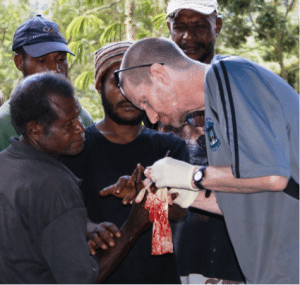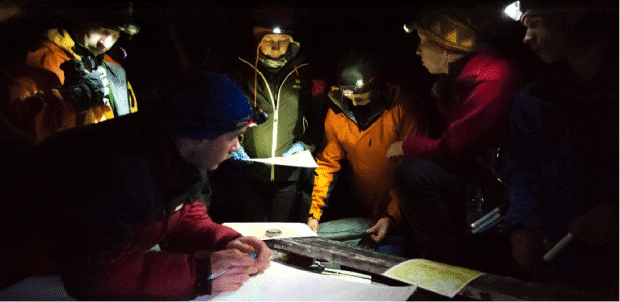Expedition and Wilderness Medicine
Guest post Dr Edi Albert – Associate Professor, Remote and Polar Medicine at the University of Tasmania. Director, Wilderness Education Group
These two nearly synonymous terms refer broadly to the practice of medicine in austere and remote environments. The former term suggests a “journey with a purpose”, whether scientific, humanitarian, or recreational. The latter terms suggests an environment “undisturbed by human activity”. Either way, a pretty cool way to practice medicine.
It is within this context that we can identify three broad aspects to expedition and wilderness medicine: pre-departure preparation and planning, care of expeditioners (and sometimes local inhabitants) whilst on their travels, and providing education and advice to others (often to those without health-care backgrounds).
Thus, depending upon the types of environment visited, the modes of transport used, and the purpose of the trip, one may find significant overlaps with military medicine, aviation medicine, maritime medicine, travel and tropical medicine, and sports medicine and physiology.
There is an emphasis on environmental medicine and physiology (yep, there’s the “P” word again…it crops up quite a lot I’m afraid!). This may include cold injuries, heat illness, high altitude illness, hyperbaric and diving medicine, and toxinology.
There is an old saying that “if you can’t look after yourself, how can you look after others?” To that end it is extremely important to develop field and rescue skills: meteorology, navigation, survival techniques, rope-skills, and leadership – to name but a few.
Whilst a difficult or complex emergency in the back of beyond will get the interested “LITFL” reader’s adrenaline pumping, mostly expedition and wilderness medicine is about preparation, planning, and prevention. A horrible accident or serious incident (unless it is another group!) could reflect badly on you and the expedition leader, rather than be an opportunity to be a hero. Treatments are mostly simple complaints: gastro-intestinal upset, minor wounds, and the odd febrile illness, but you do need to be prepared for any eventuality.
No one conventional medical specialty can claim to “own” expedition and wilderness medicine, but in terms of practising effectively it helps to have a broad based training, rather than working in a sub-specialty. You can’t just step out of a hospital or clinic environment and take a conventional set of attitudes, guidelines, protocols, and skill sets with you.
Even in Retrieval Medicine, where the aim is to “bring a hospital standard of care to the patient” it is a very different world from your ED or ward. How much more so when even greater limitations in equipment, pathology, and imaging force you to use just your clinical judgement, and when isolation forces you to reassess your priorities and re-think the risks?
The effective practice of Expedition and Wilderness Medicine requires a large degree of pragmatism and improvisation, the ability to confidently make decisions without all the information you would ideally like to have, and then to act upon them. There’s no point knowing the 101 causes of elevated serum rhubarb if you can’t work out how to move an injured patient out of the rain.
There is an ever increasing body of research, education, and practical opportunities in the field of Expedition and Wilderness Medicine.
Books, Journals, and Internet Resources
The Wilderness Medical Society (WMS) is a US-based international non-profit organisation devoted to wilderness medicine education and research. The WMS produces the peer-reviewed Wilderness and Environmental Medicine Journal as well as Practice Guidelines and an online Lecture Series. The International Society for Mountain Medicine focuses on scientific and practical aspects of mountain medicine, and publishes the High Altitude Medicine and Biology journal.
A choice of two great tomes awaits the avid reader. Not only do they contain just about everything you might want to know, they are heavy enough to hold a tent down in the most severe of storms! Wilderness Medicine, edited by Paul Auerbach is the first of these, and Expedition and Wilderness Medicine edited by Bledsoe, Manyak, and Townes is the other.
If you want something detailed enough as a reference, yet small enough to take with you, then the second edition of the Oxford Handbook of Expedition and Wilderness Medicine would be hard to beat.
If you are after something to fit in your back pocket, or to recommend to non-medical folk, then Pocket Wilderness Medicine and First Aid by Jim Duff and Peter Gormly is probably the pick of the bunch.
There is now a wide array of useful information freely available on the internet. As we develop a series of posts on various topics we will include some specific resources.
But, so you don’t miss out now, here are three that have a broad scope:
- The Adventure Medic is an online magazine with regular articles, reports, videos (that tend to make one feel inadequate) and a jobs and volunteering section.
- The Centers for Disease Control “Yellow Book” is updated and published online every two years. It is the best “go to” site for all matters related to travel medicine and health.
- The Expedition Medical Cell at the Royal Geographical Society has a number of useful resources including free access to the Expedition Handbook, a list of vacancies for expeditions, and information on courses.
Courses and Educational Programs
There are numerous providers of expedition and wilderness medicine courses around the world. These vary from short first aid courses for the lay person to extensive post-graduate education designed for health professionals. They are a great way to stimulate or consolidate your interest in expedition and wilderness medicine. Here are a few to choose from, with a focus on those closest to home.
Australia & New Zealand
“Wilderness First Aid” Courses are provided by:
- Wilderness First Aid Consultants
- Wilderness First Aid Australia
- Survive First Aid
- Wilderness Medicine Institute
- Advanced Wilderness Life Support (AWLS)
There are a number of options aimed at health professionals:
- The Remote and Polar Health Stream within the MPH program at the University of Tasmania is a collaboration with the Australian Antarctic Division and incorporates an 8 day residential course in Expedition Medicine, that is also offered as a stand-alone course.
- Otago University and James Cook University both offer single theoretical units in Expedition and Wilderness Medicine as electives in their Travel / Remote Medicine programs.
- Medicine on the Edge run various (usually overseas) workshops and conferences, some of which have an expedition and wilderness flavour.
- Expedition Medicine & Wilderness Medicine (Australia), an off-shoot of the UK based organisation, offer 4 day residential courses.
United States
In the USA, Wilderness Medicine has become “big business”. Here are just a few options to get you started:
- The WMS provides the Fellowship of the Academy of Wilderness Medicine based around a core curriculum and experience in wilderness medicine activities, as well as regular conferences.
Wilderness First Responder courses are provided by the following well respected organisations:
- Wilderness Medicine Institute of NOLS
- Advanced Wilderness Life Support (AWLS)
- Wilderness Medical Associates
- Remote Medical International
The University of Colorado Section of Wilderness and Environmental Medicine offers a number of different courses, including
- Advanced Wilderness Life Support (AWLS)
- Wilderness First Aid
- Mountain Medicine including a Diploma in Mountain Medicine
- Tropical Medicine
- Polar Medicine
United Kingdom
The UK also has various training options and research options. Medex run high altitude research expeditions every few years and started the UIAA-ISSM accredited Diploma in Mountain Medicine, which is now being run by the Royal College of Surgeons in Edinburgh. Various other countries have since started providing this diploma. Perhaps one of the more interesting ways to complete this is via the Mountain Medicine Society of Nepal. Expedition Medicine run various courses based in the UK and other countries.
Jobs and volunteering
Opportunities to work in Expedition and Wilderness Medicine are many and varied. The Adventure Medic and Royal Geographical Society websites mentioned above are good places to start. Like many other aspects of life, networking with like-minded professionals often opens doors that you didn’t know existed.
A career in expedition and wilderness medicine?
Expedition and wilderness medicine unites doctors, nurses, and paramedics through their desire to use their medical skills as a passport for adventure and to regularly challenge themselves professionally out of their comfort zone. There is also a natural bridge to humanitarian medicine and the opportunity to contribute to the health care of the (often poor and underserved) people in whose wonderful landscapes we choose to sojourn.
Don’t expect full time career; see it more as a side line or hobby. Don’t aim to make money out of expedition and wilderness medicine, but find instead that you become enriched in many ways that are far more important.




